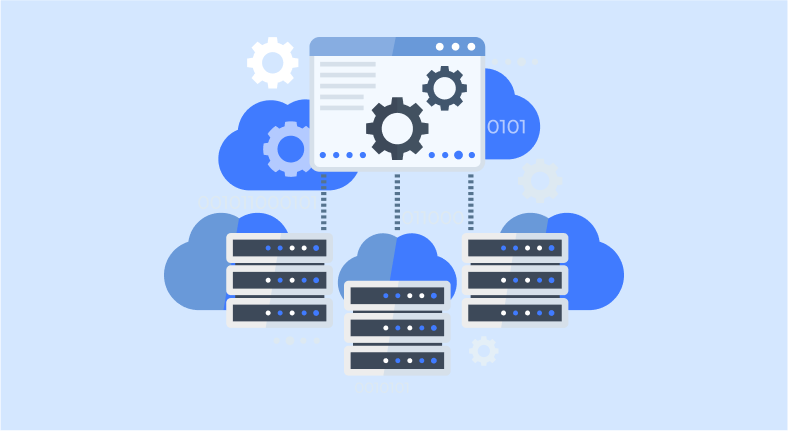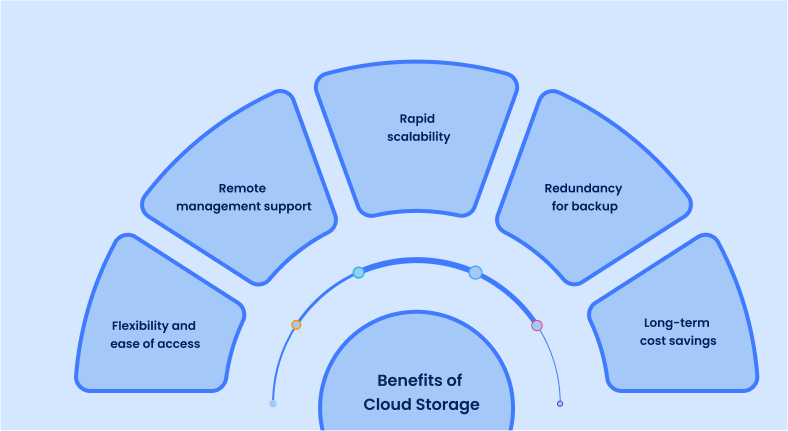What is Cloud Storage?
Cloud storage is a service that allows users to store and access files online. It is often used as a way to backup data or to share files between devices.
#1
Unlimited Cloud Storage
#2
Advanced Data Encryption
#3
Dashboards and Reports
#4
Data Protection
#5
End-to-End Visibility
#6
Multiple File Sharing System
#7
Universal Access
#8
24/5 Support
#9
Unbelievable pricing - the lowest you will ever find
#10
Everything your business needs - 50 apps, 24/5 support and 99.95% uptime
In a cloud storage, digital data like documents, images, videos, and other types of media are kept on virtual servers that are hosted by third parties. You can move data onto an offsite storage system and access it whenever you need to. The cloud computing approach of "cloud storage" enables customers to store crucial data or media files on distant, outside servers. These servers are always available to users through the internet. Cloud storage, also referred to as utility storage, is managed and run by a cloud-based service provider. Cloud storage offers a wide range of advantages, including improved accessibility and data backup. The two most noticeable ones are their high storage capacity and low price. By providing on-demand services, cloud storage eliminates the need to build and maintain your own data storage infrastructure. You may access data "anytime, anywhere" with this, which gives you agility, durability, and global scale.

How to Use Cloud Storage Working as a virtual data centre is cloud storage. It provides applications and end users with virtual storage infrastructure that may be scaled to the needs of the application. It often interacts with internal cloud storage infrastructure via a web-based API that is developed remotely. A user can connect to at least one data server in cloud storage over the internet. The user delivers files to the data server, which manually or automatically distributes the message to numerous servers over the internet.
A web-based interface is then used to access the saved data. Cloud storage systems use a significant number of data servers to guarantee the ongoing availability of data. The user can be confident that the data has been relocated elsewhere to ensure availability even if a server needs repair or fails.
Benefits of Cloud Storage

Flexibility and Ease of Access: By using cloud storage, your data is not restricted to a single location. A number of stakeholders can access cloud-stored assets from any place and on any device they want without having to download or install anything.
Remote Management Support: It is provided by cloud storage, allowing internal IT employees or managed service providers to administer systems remotely (MSPs). They can troubleshoot remotely, hastening the resolution of problems.
Rapid Scalability: One key advantage of cloud storage is the ease with which new resources may be added without the inclusion of any new infrastructure. When faced with an unprecedented increase in data volumes, this feature aids business continuity.
Redundancy for Backup: A reliable backup system requires the replication of the same data in several locations, or data redundancy. In the event of a natural disaster, accident, or cybercrime, the cloud guarantees that your data is kept secure in a distant place.
Long-term Cost Savings: Continuing financial savings The expenditures of hardware equipment, storage facilities, power supplies, and staff, which are certain to rise as your firm expands, can be dramatically reduced over time using cloud storage.
Summary
Even if the cloud is a key component of data processing and storage, the cloud and data storage are changing quickly in the future. One of the main issues with cloud storage is data security, and in the future, businesses that use the service will be very concerned about large-scale data breaches.
Will the cloud become outdated in such an event? What alternatives might there be for storing complex data in the future? Serverless computing is just one of many possibilities. Conducting routine assessments and locating redundant work on cloud services are our two most important recommendations for techies trying to optimise cloud services. The goal is to benefit from the freedom that the cloud provides without going over budget.





